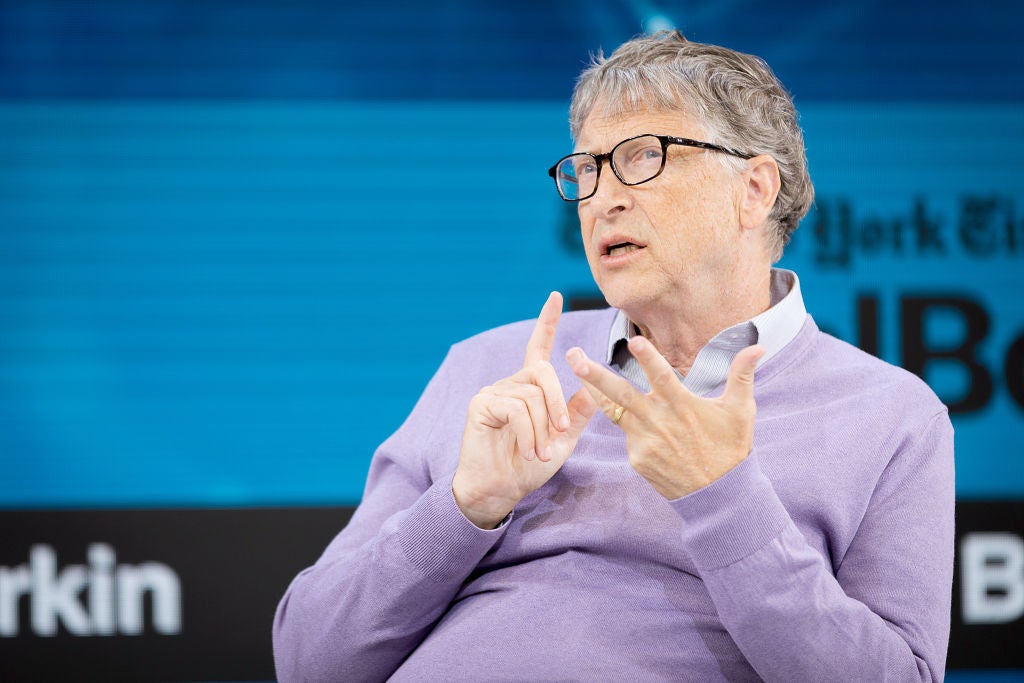Covid vaccine: Bill Gates says several more shots ‘likely’ to show strong efficacy
More effective vaccines ‘may be part of getting the supply situation solved’, says Mr Gates

Your support helps us to tell the story
From reproductive rights to climate change to Big Tech, The Independent is on the ground when the story is developing. Whether it's investigating the financials of Elon Musk's pro-Trump PAC or producing our latest documentary, 'The A Word', which shines a light on the American women fighting for reproductive rights, we know how important it is to parse out the facts from the messaging.
At such a critical moment in US history, we need reporters on the ground. Your donation allows us to keep sending journalists to speak to both sides of the story.
The Independent is trusted by Americans across the entire political spectrum. And unlike many other quality news outlets, we choose not to lock Americans out of our reporting and analysis with paywalls. We believe quality journalism should be available to everyone, paid for by those who can afford it.
Your support makes all the difference.Several more vaccine candidates are likely to show strong efficacy in preventing people from becoming infected with Covid-19, Bill Gates has said.
Shots being developed by AstraZeneca, Novavax and Johnson & Johnson were among those Mr Gates said were the frontrunners.
His comments came a week after an interim analysis by Pfizer/BioNTech - a US-German collaboration - showed their candidate was 90 per cent effective in preventing infection in late-stage global trials.
On Monday, US company Moderna said its candidate is 94.5 per cent effective. Pfizer/BioNTech have subsequently announced their jab is 95 per cent effective.
Speaking at The New York Times's DealBook Online on Tuesday, Mr Gates said: "With the very good news from Pfizer and Moderna, we think it's now likely that AstraZeneca, Novavax, and Johnson & Johnson will also likely show very strong efficacy".
The Microsoft founder and philanthropist went on to add that the AstraZeneca, Novavax, and Johnson & Johnson candidates "are a little bit easier to scale up production at very low marginal cost, and don't have the same temperature requirements".
He suggested that, if those vaccine candidates are approved they "may be part of getting the supply situation solved", raising fresh hopes of global access to vaccines.
Announcing the improved efficacy of its vaccine candidate on Wednesday, Pfizer said the jab is safe and claimed it protects older people most at risk of dying - the last data needed to seek emergency use of limited shot supplies as the catastrophic outbreak worsens across the globe.
The announcement from Pfizer/BioNTech comes as the team is preparing within days to formally ask US regulators to allow emergency use of the vaccine.
They also have begun "rolling submissions" for the vaccine with regulators in Europe, the UK and Canada and soon will add this new data.
"This is an extraordinarily strong protection," said Dr Ugur Sahin, BioNTech's CEO and co-founder.
The companies have not yet released detailed data on its study, and results have not been analysed by independent experts. Also still to be determined are important questions such as how long protection lasts and whether people might need boosters.
But all eyes are on the progress of potential vaccines as the grim infection rate jumps in the US and abroad as winter weather forces people indoors, in the close quarters that fuels viral spread.
While initial supplies will be scarce and rationed, as the supply grows Dr Sahin said the companies have a responsibility to help ensure access for lower income countries as well.
Pfizer and BioNTech also say now have the required data on the vaccine's safety needed to seek emergency authorization from the Food and Drug Administration.
The companies didn't disclose safety details but said no serious vaccine side effects have been reported, with the most common problem being fatigue after the second vaccine dose, affecting about 4 per cent of participants.
The study has enrolled nearly 44,000 people in the US and five other countries. The trial will continue to collect safety and effectiveness data on volunteers for two more years.
Pfizer and BioNTech said they expect to produce up to 50 million vaccine doses globally in 2020 and up to 1.3 billion doses in 2021.
US officials have said they hope to have about 20 million vaccine doses each from Moderna and Pfizer available for distribution in late December.
The first shots are expected to be offered to vulnerable groups like medical and nursing home workers, and people with serious health conditions.
With Associated Press



Join our commenting forum
Join thought-provoking conversations, follow other Independent readers and see their replies
Comments